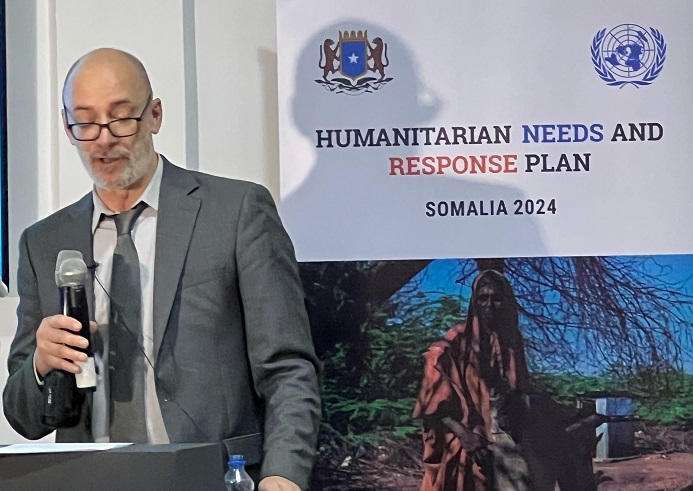Somalia was hit by multiple shocks last year, including devastating drought, unprecedented heavy rains and flooding and further mass displacement. Millions of people also continue to suffer from hunger and malnutrition, the UN said.
The plan, launched with federal and state governments, was launched as four million people – nearly a quarter of the population – remain acutely food insecure in Somalia.
Two in five children under five suffer from acute malnutrition. Some 3.8 million people are internally displaced, and a cholera outbreak is spreading in several areas.
Multiple drivers
“In addition to climatic shocks, conflict and insecurity, widespread poverty and disease outbreaks will continue to drive humanitarian needs this year,” said George Conway, Resident and Humanitarian Coordinator for Somalia.
He said it would enhance “collective outcomes that will help reduce needs, risks and vulnerabilities, increase resilience and ensure that future shocks do not lead to catastrophe.”
“More than 80 per cent of the displaced are women and children and face serious protection risks,” said Mohamud Moalim, Commissioner for the Somalia Disaster Management Agency.
“The Somali Government is concerned about the humanitarian situation that is worsened by climate-induced crises. We are determined to address the underlying causes of Somalia’s crises, improve livelihoods and build long-term durable solutions.”
Humanitarian partners will be implementing a more targeted response with a focus on assisting those in most severe need, the UN in Somalia said.
The funding requirements represent a 37 per cent reduction on last year’s request.
Iraq: Rights experts denounce ‘secretive’ executions
UN independent human rights experts on Tuesday expressed deep concern over reports that Iraqi authorities have begun carrying out mass executions within the prison system.
In a news release, the Human Rights Council-appointed experts highlighted that over 250 prisoners were facing imminent execution amid an accelerated enforcement of detainees’ sentences by the government.
“We are shocked to hear that unannounced mass executions are taking place in Iraqi prisons, particularly in Nasiriyah Central Prison, where at least 13 people were recently executed on the same day and hundreds of others are at risk of imminent execution,” the experts said, noting reliable reports that an “execution list” has been approved.
The experts – who serve in their individual capacity and are not UN staff – also voiced deep concern about the “secretive nature” of the death penalty implementation, emphasizing the need for transparency in such cases.
They also urged Iraq to publish full information each year on executions, including on those sentenced to death and the number of executions.
The experts reiterated prior concerns about Iraq’s Anti-Terrorism Law No. 13 (2005), noting its vague definition of terrorism and the potential for arbitrary accusations.
They called on the government to immediately halt all planned executions and to consider clemency and the commutation of sentences as a vital step towards complete abolition of the death penalty.
Ukraine: 11 million received vital aid last year
UN and partners assisted almost 11 million people in Ukraine last year, delivering critical aid to families whose lives have been devastated by war, the Organization’s humanitarian official in the country said on Tuesday.
Denise Brown, Humanitarian Coordinator for Ukraine, added that UN and aid agencies will continue efforts to ensure civilians receive the same level of support in 2024.
“To this end, funding will be crucial. The suffering of the Ukrainian people is not over, and our support is as necessary as ever,” she said.
Throughout 2023 via 100 inter-agency convoys, humanitarians provided people in Ukraine with food supplies, water and hygiene supplies, repair kits, healthcare, education and demining services as well as psychosocial counselling and legal aid.
In the winter months, they delivered clothes, blankets, fuel and insulation to help families keep warm in temperatures as low as minus 20°C.
“However, for another entire year, we were prevented from helping people in areas occupied by Russia, where humanitarian needs are direst and the response extremely limited,” Ms. Brown said.
She added humanitarian efforts will continue despite the repeated denial by Russian authorities.
WMO confirms new heat record for Europe
The World Meteorological Organization (WMO) has officially confirmed a new record temperature for continental Europe of 48.8°C – that’s nearly 120°F.
The searing temperature was recorded in Syracuse on the Italian island of Sicily on 11 August 2021 and verified by an international panel of atmospheric scientists.
The previous record of 48.0°C had been held by the Greek cities of Athens and Elefsina since July 1977.
However, it was based on government sources and not independently verified by WMO, the UN’s weather agency.
Spokesperson Clare Nullis said it was important that the world “has confidence” that global records are properly measured and verified, adding that “the extremes that we are monitoring, verifying [are] snapshots of our changing climate”.
The agency said the investigation also demonstrates the alarming tendency for continuing high temperature records to be set, warning that greater extremes will occur across Europe in the future.
The confirmation involved lengthy procedures, meticulous care and painstaking evaluation to ensure the levels of confidence, Ms. Nullis added.
UN.

